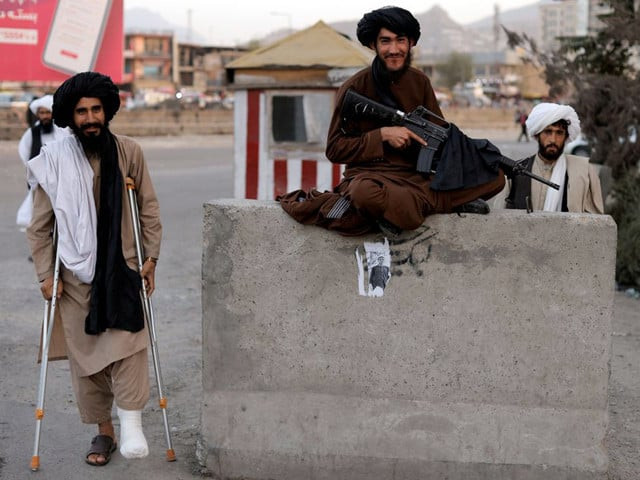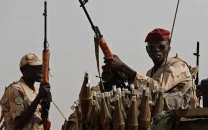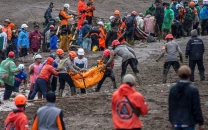Chorus for unfreezing assets, warnings of 'catastrophe' in Afghanistan grow louder
Ahead of US-Taliban talks, humanitarian groups reiterate need for immediate action to avert disaster in Afghanistan

As the US gears up for a fresh round of talks with the Taliban, calls are growing louder by the day for Washington and its partners to lift restrictions that have left Afghanistan unable to stave off a rapidly spiraling economic crisis.
Thomas West, Washington’s special envoy for Afghanistan, will visit Qatar next week for discussions with Taliban leaders on a range of issues, chief among them being Afghanistan’s dire economic situation and growing need for humanitarian assistance, the US State Department said on Tuesday.
The announcement raises hopes for a country that, according to global rights group Amnesty International, has been pushed into “a full-blown economic crisis” due to the “suspension of foreign aid, the freezing of Afghan government assets, and international sanctions on the Taliban.”
Since the Taliban reclaimed power on Aug. 15, development aid has dried up and billions of dollars in Afghan assets have been frozen by the US.
Apart from the Taliban, China and Pakistan have also repeatedly called for Afghan assets to be unblocked, while social media in and outside Afghanistan has been abuzz with passionate appeals.
“The international community must urgently ease existing financial restrictions on Afghanistan that are blocking the provision of healthcare, food and other essential services, and expedite delivery of scaled-up humanitarian assistance to avert a mounting crisis that threatens the lives of tens of millions of people,” read an Amnesty report issued on Tuesday.
This came a day after the UN Development Program said the country’s “financial and bank payment systems are in disarray,” warning that “there is no humanitarian solution for Afghanistan” without a functioning banking system.
The International Committee of the Red Cross (ICRC) also released a statement on Monday urging the international community to “engage with Afghanistan.”
“This is the only way to prevent a total collapse of essential services like health care and education. Political considerations should not interfere with humanitarian action. A political solution must be found to avoid irreparable humanitarian consequences,” said Dominik Stillhart, the group’s director of operations who was in Afghanistan for six days.
He said aid for Afghanistan has been jeopardized “as donors ask themselves how they can comply with their legal obligations stemming from relevant UN Security Council resolutions.”
“The ICRC is calling for a clear carve-out for impartial humanitarian organizations engaged in exclusively humanitarian activities, and for its translation into domestic legislation,” said Stillhart.
“It is in everyone’s interest to see humanitarian activities operating smoothly in Afghanistan.”
‘Scene set for human catastrophe’
According to the UN Office for Coordination of Humanitarian Affairs, nearly 23 million of Afghanistan’s around 40 million people are facing acute food insecurity and hunger, while the World Food Program estimates that at least 1 million children are already malnourished.
“Current levels of humanitarian assistance are insufficient to deal with the crisis, with millions of Afghans plunging into poverty and facing the risk of starvation. We have seen countries making pledges and promises to provide aid to Afghanistan over recent months, but this support is yet to reach those who need it the most,” said Yamini Mishra, Amnesty International’s regional director for South Asia.
Citing UN data, the Amnesty report said more than $200 million in humanitarian aid a month is needed to avert disaster in Afghanistan.
In September, the international community pledged $1.2 billion for Afghanistan at a UN conference in Geneva, followed by a promise of $1.15 billion by the EU at the G20 Summit in October.
“Without an urgent program of targeted international support and without permitting the use of Afghanistan government reserves to support the country’s population, the scene is set for a human catastrophe over the coming months,” Mishra said.
“In just a few months, the situation is already critical. People in the public and private sectors have not been paid their salaries, can’t access money, and can’t afford even essential items. Food insecurity is an issue throughout the country. Afghanistan is at the precipice.”
The Amnesty official reiterated that humanitarian aid “must not be politicized” and the world’s top priority must be to prevent more death and suffering in Afghanistan.



















COMMENTS
Comments are moderated and generally will be posted if they are on-topic and not abusive.
For more information, please see our Comments FAQ